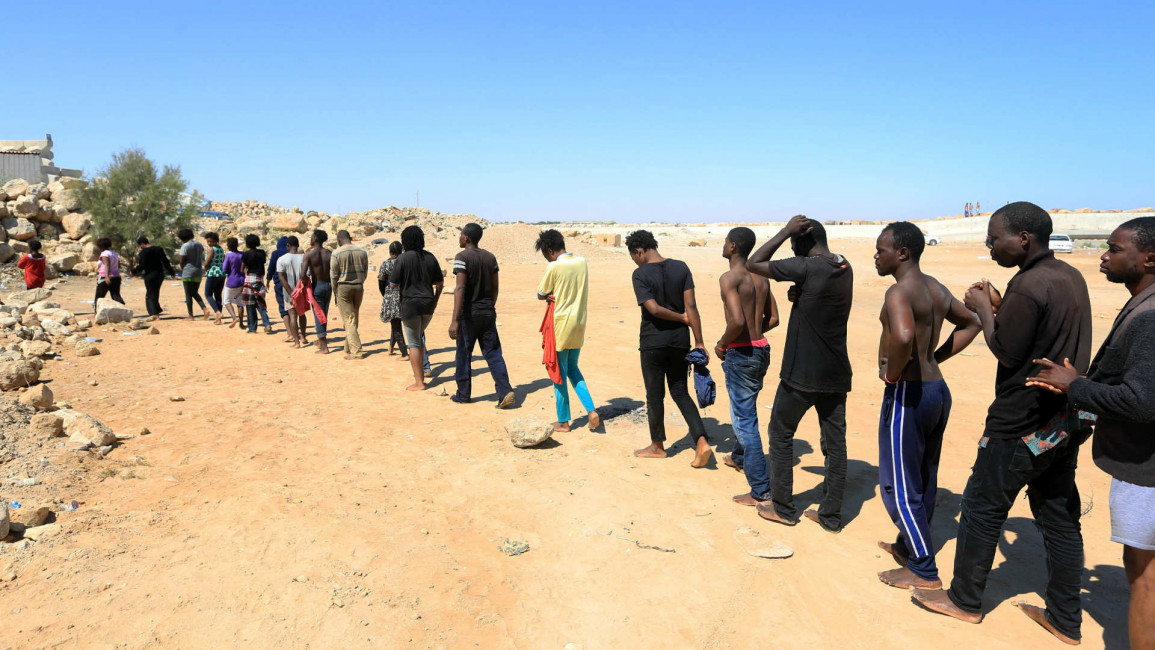Former migrants say video of dead woman is common in Libya's detention centers
Shocking footage has emerged of a woman lying dead on the floor of a migration detention centre in Libya. Former detainees say the scene is a typical daily reality there.
"When you live there, you get used to death. People died, every day there, of malnourishment and torture," Amara, a woman from Sierra Leone who was previously detained in Abu Salim centre, told The New Arab. As everyone in this report, her name was changed to protect her identity.
Shared by the Guardian, the video shows a room inside the Abu Salim detention centre in Tripoli, where hundreds of woman asylum seekers are crammed together on beds; a Nigerian woman is heard crying out and calling the facility a "prison".
A malnourished woman appears to be lying dead on the ground, unclothed, her eyes open. "This woman is dead; she died this morning," says the Nigerian woman.
Today, graphic footage of a deceased woman on the floor of #AbuSalim detention centre, under the control of DCIM, was published online. This horrifying video sheds light once again on the hellish conditions inside #Libya’s detention centres.
— Lawyers for Justice in Libya (@LibyanJustice) August 29, 2023
https://t.co/lsLl2g8iCi
The 30-second clip is believed to be filmed two weeks ago by a group of migrants who arrived in Tunisia from Libya.
According to the Guardian, Médecins Sans Frontières (MSF) and a UN source confirmed the video's authenticity and said it was filmed at Abu Salim.
The woman in the video, whose identity is still unknown, is believed to be from Somalia and may have died from tuberculosis - a disease dozens of asylum seekers detained at Abu Salim have contracted while languishing in crowded rooms with no access to medical care.
This is not the first time the facility has been exposed to its terrible conditions and incidents of violence against refugees and migrants.
'Abu Salim is hell'
Thousands of refugees and migrants are held in detention centres across Libya, nominally run by the Directorate for Combating Illegal Migration (DCIM) and overseen by the Ministry of the Interior.
Detention centres across Libya are used to house people whom the EU-backed Libyan coastguard has forcibly returned after trying to reach Europe across the Mediterranean.
An Amnesty International report in 2021 alleged that guards coerced women into sex in exchange for water and shot at detainees.
In June 2021, automatic weapons were fired at detainees, leading to several casualties, according to MSF.
Former detainees in the centre say the only way to escape is to pay a ransom of US$1,000.
"The camp had barbed wire around the border. The guard shot whoever tried to escape," Mustapha, a former detainee, said as he described how torture, hunger and sexual abuse made life impossible for everyone trapped there.
"There is no other way out of there (Abu Salim). That place is hell on earth," he added.
Libyan authorities have vowed to close DCIM centres, but human rights violations have continued in newly opened or reopened centres, according to Amnesty Rights Group.
Migrants trapped between Tunisia and Libya
While abuse of refugees and migrants in Libya has been well-documented over the past years, Tripoli has remained a key pillar of European efforts to control migration.
A controversial deal between Libya and Italy and, by extension, the European Union (EU) to "combat illegal immigration" was renewed earlier this year.
Over the past years, Tunisia has become a haven for migrants and asylum seekers away from the abusive Libyan detention centres. However, everything has changed since President Kais Saied's speech in February.
As he accused criminal parties of sponsoring the migration of black people to Tunisia to change the country's demography, racism and violence against migrants escalated in the North African state, with many Tunisians blaming their country's struggles on the arrival of Sub-Saharans.
Last month, Tunisian authorities dumped hundreds of migrants in the scorching Sahara on the Libyan borders.
After dozens of fatalities, Tripoli and Tunis decided on August 10 to share responsibility for providing shelter for the migrants. Hence, hundreds of migrants were sent back to the detention centres they once escaped.
Tunisia, which has surpassed Libya as the principal departure hub for people trying to reach Europe, signed with the EU last month signed a €1bn deal to help stem irregular migration.
The EU has so far remained silent on Tunisia's treatment of Sub-Saharan migrants.



